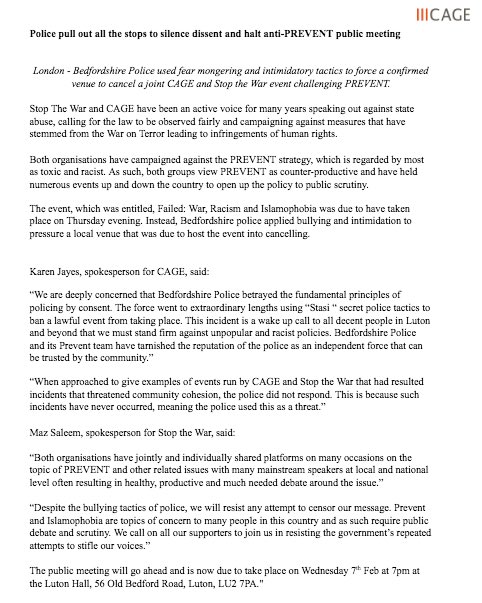Salaam
Another update
Preventing Prevent
Young Muslims are being unfairly reported as extremists
When I was at university studying my undergraduate degree, I developed a long-running in-joke with my friends and flatmates about being the only Muslim. A huge part of this involved kidding around about our internet search histories, and how I was probably definitely on a watchlist somewhere by dint of being brown and Muslim.
It was a way of coping with the mistrust aimed at me in everyday situations, like when I got stared at suspiciously after boarding public transport with a backpack full of books – it was a way of making light of the situation, because sometimes if you don’t laugh at the absurdity of it all, you’ll cry.
When the Syrian refugee crisis came to a head, scores of young brainwashed women went to Syria, to join ISIS. Amid all this my curious flatmate searched flights to Syria, wondering if it was even possible to find travel options to the war-torn country. It wasn’t, obviously.
I joked about it like we always did. “Why on earth would you search flights to Syria when you live with a Muslim woman?” I asked him. “When MI5 break down the door and drag me away because they think I’m a fundamentalist, I’m blaming you!”
It’s not something to joke about. Because the truth is, being questioned over something like that wouldn’t be anything out of the ordinary for a Muslim university student. For many of us studying after the Prevent Duty was enforced in 2015, being watched and reported has become part of our way of life. And that’s not funny.
What is Prevent?
Prevent is one of the four strands of CONTEST, the UK’s counter-terrorism strategy. The other three strands are named Pursue, Protect and Prepare respectively, but Prevent has been the section of the counter-terrorism strategy to hit headlines consistently.
Prevent is often explained to the public as a UK-wide safeguarding policy, to stop vulnerable members of society being exposed to the views of terrorist groups; to identify those who might have already been exposed to extremist views, and eventually to stop instances of homegrown terrorism.
The policy was first proposed by New Labour in 2006, and was transformed by the Conservative/Liberal Democrat coalition in 2011: this version of Prevent drew strong criticisms, but despite this, the policy was broadened and made compulsory in public institutions in 2015.
Every person working in specific parts of the public sector is given mandatory Prevent training: from primary school teachers to NHS staff, from those working for charities to those involved in community groups. These people have a responsibility, under the 2015 Prevent Duty, to report any individuals who seem to be at risk of being drawn into terrorist activity, or who may have been exposed to extremist views.
Once individuals are reported, they are reviewed, and if they are confirmed to be at risk of holding extremist views, are referred to Prevent’s sister-initiative, Channel. Channel is a police-led initiative which aims to support these vulnerable individuals and deter them from committing acts of terrorism, with support from Muslim mentors.
Young Muslims targetted
Young Muslims are disproportionately affected by Prevent referrals. The vast majority of the 7,631 people referred under the policy were aged 20 or under, the latest government data shows. Two-thirds of all referrals were due to worries about “Islamist” extremism, and 10% (759 people) were referred due to worries about “extreme right-wing” extremism.
Muslims are 40 times more likely than a non-Muslims to be targetted – in fact, one in every 500 Muslims in the UK are referred to Prevent.
What is more troubling is it seems like young Muslims are being profiled, as the majority of those who are referred under Prevent are in no danger of radicalisation. Of all the people referred, only 5% are directed through the Channel initiative to receive specialist help.
Uneven application
Prevent allows governments to look like they’re doing something substantial to tackle home-grown terrorism, whether by supporting the policy, condemning it, or calling for an independent review.
Conservatives stand behind the policy, having rolled out the Prevent Duty in 2015, but failed to mention it in their Manifesto, whereas Labour have promised to review it in their Manifesto, stating: “In doing so, we will address the government’s failure to take any effective new measures against a growing problem of extreme or violent radicalisation.”
However, critics argue Prevent fails to cover an area where it is needed most. Despite the fact that Northern Ireland has a higher threat rating used by MI5, Prevent is not implemented there – when this was questioned in a Commons debate in January 2016, Gavin Robinson, the MP for Belfast East, said: “That is an important point. The Government recently published a counter-extremism strategy. When I asked why Northern Ireland, which has a fair number of extremists, was not included in the strategy, I was told,
‘Don’t push the issue too far. It is really a counter-Islamic strategy’.”
Communities and censorship
The most prominent criticism of the Prevent strategy is the disproportionate way it affects Muslim communities and black communities. Nothing happens in a vacuum — with right-wing media outlets in the UK pushing narratives that paint non-white and Muslim people as extremists, and white non-Muslims who perpetrate violence against others as “lone wolves”, there are popular ideas of who “counts” as a terrorist, and who doesn’t. These ideas, as well as factors like racist and Islamophobic attitudes, are very likely to contribute to the over-referral of Muslim and black (and black Muslim) people to Prevent.
Another concern is that Prevent may be encouraging censorship at universities and schools. In a 2015 statement, the University and College Union stated: “The government’s approach is a dangerous strategy. It risks silencing those who are most vulnerable, leaving them no space in which to express their opinions or be challenged safely. Due to the Islamophobic narrative surrounding ‘extremism’, it also risks certain communities being targeted unfairly.”
There is also a complete lack of transparency surrounding Prevent. The latest figures don’t show answer many of the important questions: who is reporting people to Prevent? How effective is the strategy? What percentage of people put through Prevent and Channel still go on to commit acts of terrorism?
There’s also some secrecy surrounding the resources used to create and implement Prevent. Manchester-based creative Afshan D’Souza-Lodhi worked on a counter-terrorism project for the now-defunct Greater Manchester Police Authority, not realising that her contributions as a young Muslim woman were then used for Prevent.
She tells The Overtake: “It was a ‘counter terrorism and preventing violent extremism project’. With a team of young people, I helped write a teachers’ resource pack so that teachers could take it into schools and have uncomfortable conversations with young people. Did I realise that it would give teachers the ability and ease to ‘put people on lists’? No, of course not. Does it make me a little uncomfortable now? Yes.”
As a Muslim woman, Afshan resents not being told what her work was used for: “Knowing what I know now about Prevent and the targeting of young Muslims, it makes me a little uncomfortable that I worked on a project doing exactly that. At the time I thought it was a good way to address (what I now know to be) Islamophobia and racism. I didn’t think it would be used to target anyone, whatsoever. But then I was 16, eager to help and creatively active.”
The Prevent Duty has been called out by NGOs on several occasions, for varying reasons. Some groups state that Prevent has a detrimental effect on people who don’t need to be referred to counter-terrorism initiatives, but to mental health services.
Others point to various cases in which a double standard is in place, where Muslims are either reported for ridiculous reasons or treated differently from their non-Muslim counterparts in similar scenarios. For example, schools in BNP and EDL heartlands were only targeting Muslims for Prevent referrals. In another scenario, a physics teacher explained the concept of nuclear fission to their students, and a few students in the class had queries about how nuclear fission related to nuclear bombs – of these students, the only request for a Prevent referral was for a young Muslim boy.
These differences in the way that young Muslim children are treated has had obvious consequences – the Muslim Council of Britain has heard reports from worried parents of the Islamic faith who actively discourage their children from discussing their faith at school.
Calls for independent review
Since 2011, Prevent has been dogged by calls for an independent review, or a scrapping of the policy altogether. The Muslim Council of Britain has consistently asked for an independent review of the Prevent strategy, stating that an effective strategy for counter-terrorism that includes Muslim communities instead of alienating them, is desperately needed.
In 2016, an open letter backing independent review, signed by 380 people, including MPs, academics, NUS officers and prominent human rights lawyers was delivered to Parliament. Even former security officials who worked on Prevent have criticised it, referring to it as “a toxic brand”, and “counterproductive”.
Students Not Suspects: Preventing Prevent
The National Union of Students is openly anti-Prevent, and two years ago, launched the Students Not Suspects campaign in response to the 2015 Prevent Duty. Hareem Ghani, the NUS Women’s Officer, explained that the initial campaign focused on non-compliance and a national tour to educate students on what the Prevent Duty was, and how to pass policy against it in Student Unions.
The NUS provides resources for countering the strategy, like a handbook and the Prevent helpline, which gives students affected by Prevent support and advice. The NUS is also set to host another UK-wide tour of universities to raise awareness.
“The biggest concern for me is the way in which Prevent is affecting our education,” Ghani says.
“The Education Sector, for example, accounts for 33% of all referrals. The Prevent duty is breeding an atmosphere of distrust, leading to a culture of over-reporting and most worryingly cracking down on academic debate and political dissent – see, for example, the ways in which Palestinian student societies have been targeted in the past year.”
When asked what the current government should be doing, Ghani thinks that they “should be meeting with external stakeholders who have legitimate concerns about the policy and calling for a review (if not repealing the duty altogether).”
“Let’s be absolutely clear about what it is that we’re saying: we are aware that radicalisation is a pressing issue, and we agree it needs to be addressed. However, the current policy as it stands is fundamentally flawed. We need a policy that is effective and engages with the Muslim community, rather than vilifying them altogether.”
https://theovertake.com/~alpha/preventing-prevent/
- - - Updated - - -
Salaam
Police are determined to intimidate those who oppose the prevent programme.


